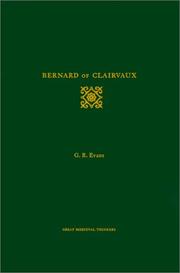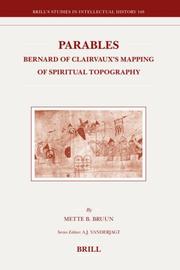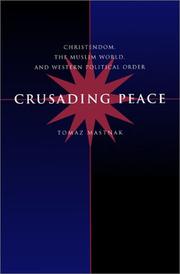| Listing 1 - 8 of 8 |
Sort by
|

ISBN: 1280530251 0198028997 1429400331 9781429400336 9780195125252 0195125258 9780195125269 0195125266 9780198028994 0195125258 0195125266 0197738346 Year: 2000 Publisher: New York : Oxford University Press,
Abstract | Keywords | Export | Availability | Bookmark
 Loading...
Loading...Choose an application
- Reference Manager
- EndNote
- RefWorks (Direct export to RefWorks)
G.R. Evans provides a concise introduction to St Bernard of Clairvaux (1090-1153), a major figure on the 12th-century monastic and theological scene.
Bernard, --- Bernard de Clairvaux, --- Bernardo, --- Bernardus, --- Bernhard, --- Bernhardus, --- Clairvaux, Bernard of, --- 2 BERNARDUS CLARAEVALLENSIS --- 2 BERNARDUS CLARAEVALLENSIS Godsdienst. Theologie--BERNARDUS CLARAEVALLENSIS --- Godsdienst. Theologie--BERNARDUS CLARAEVALLENSIS --- Bernard of Clairvaux --- Theology, Doctrinal --- Philosophy, Medieval --- Bernardus ab. Clarevallensis

ISBN: 9789004155039 9004155031 9786611457976 1281457973 9047411560 9789047411567 9781281457974 6611457976 Year: 2007 Volume: v. 148 Publisher: Leiden Brill
Abstract | Keywords | Export | Availability | Bookmark
 Loading...
Loading...Choose an application
- Reference Manager
- EndNote
- RefWorks (Direct export to RefWorks)
This volume is a study of spatial structures in Bernard of Clairvaux’s Parables . It lays out a spiritual topography which is linked to the rumination of the Bible. The topography ranges across such locations as Paradise, Babylon, the bridegroom's chamber, and the Celestial Jerusalem, and man navigates it in the character of peregrinus and viator . The first part of the study addresses the spiritual topography and the hermeneutics of its mapping. The second and larger part examines each of Bernard's eight parables and the ways in which he reformulates issues central to monastic tradition – militia Christi , for example, God's image and likeness in man, contemptus mundi , the quest for beatitude – as voyages within spiritual landscapes.
Bernard of Clairvaux --- Spiritual life --- Vie spirituelle --- Catholic Church. --- Eglise catholique --- Bernard, --- -248 BERNARDUS CLARAEVALLENSIS --- Life, Spiritual --- Religious life --- Spirituality --- Catholic Church --- Spiritualiteit. Ascese. Mystiek. Vroomheid--BERNARDUS CLARAEVALLENSIS --- Bernard de Clairvaux, --- Bernardo, --- Bernardus, --- Bernhard, --- Bernhardus, --- Clairvaux, Bernard of, --- 248 BERNARDUS CLARAEVALLENSIS --- Catholic authors
Book
ISBN: 1501751042 9781501751042 1501751549 1501751557 9781501751547 9781501751554 Year: 2020 Publisher: Ithaca
Abstract | Keywords | Export | Availability | Bookmark
 Loading...
Loading...Choose an application
- Reference Manager
- EndNote
- RefWorks (Direct export to RefWorks)
This intimate portrait of one of the Middle Ages' most consequential men, delves into the life of Saint Bernard of Clairvaux to offer a refreshing interpretation that finds within this grand historical figure a deeply spiritual human being who longed for the reflective quietude of the monastery even as he helped shape the destiny of a church and a continent. Heresy and crusade, politics and papacies, theology and disputation shaped this astonishing man's life, and this book presents it all.
Christian saints --- Bernard, --- Bernard de Clairvaux, --- Bernardo, --- Bernardus, --- Bernhard, --- Bernhardus, --- Clairvaux, Bernard of, --- Church history --- Monasticism, Cistercian abbots, papal schism of 1130s, monastic spirituality, difficult saint, Bernard the monster. --- Christian saints - France - Biography. --- Bernardus ab. Clarevallensis --- Bernard, - of Clairvaux, Saint, - 1090 or 1091-1153.

ISBN: 0520925998 1597345598 9780520925991 9780520226357 0520226356 9781597345590 Year: 2002 Publisher: Berkeley, Calif. University of California Press
Abstract | Keywords | Export | Availability | Bookmark
 Loading...
Loading...Choose an application
- Reference Manager
- EndNote
- RefWorks (Direct export to RefWorks)
Tomaz Mastnak's provocative analysis of the roots of peacemaking in the Western world elucidates struggles for peace that took place in the high and late Middle Ages. Mastnak traces the ways that eleventh-century peace movements, seeking to end violence among Christians, shaped not only power structures within Christendom but also the relationship of the Western Christian world to the world outside. The unification of Christian society under the banner of "holy peace" precipitated a fundamental division between the Christian and non-Christian worlds, and the postulated peace among Christians led to holy war against non-Christians.
Crusades. --- Peace --- Just war doctrine --- Monarchy --- Kingdom (Monarchy) --- Executive power --- Political science --- Royalists --- Jus ad bellum --- War --- War (Philosophy) --- Coexistence, Peaceful --- Peaceful coexistence --- International relations --- Disarmament --- Peace-building --- Security, International --- Church history --- Middle Ages --- Chivalry --- Religious aspects --- Christianity --- History of doctrines --- History --- Islam. --- Moral and ethical aspects --- Europe --- bernard of clairvaux. --- bishops. --- blanquerna. --- boniface. --- cardini. --- carolingian. --- christendom. --- christian sects. --- christianity. --- church doctrine. --- church history. --- crusades. --- diplomacy. --- empire. --- europe. --- holy crusade. --- holy peace. --- holy war. --- imperialism. --- islam. --- just war. --- medieval. --- middle ages. --- middle east. --- monarchy. --- monks. --- muslim world. --- pagans. --- papal monarchy. --- peace. --- peacemaking. --- peter the venerable. --- philip iv. --- religion. --- religious violence. --- religious war. --- roger bacon. --- spirituality. --- st francis of assisi. --- thomas aquinas. --- war. --- warrior monks. --- will of god.
Book
ISBN: 9028910484 Year: 1985 Publisher: Antwerpen De Nederlandsche Boekhandel
Abstract | Keywords | Export | Availability | Bookmark
 Loading...
Loading...Choose an application
- Reference Manager
- EndNote
- RefWorks (Direct export to RefWorks)
Abaelardus, Petrus --- Bernardus van Clairvaux --- Cisterciënzers --- Geschiedenis --- Kerkgeschiedenis --- Middeleeuwen --- Church history --- Bernard, --- Abelard, Peter, --- 940"11" --- C3 --- filosofie --- kerkgeschiedenis --- middeleeuwen (x) --- Geschiedenis (Middeleeuwen) --- #GROL:SEMI-1'10/11' --- #gsdb8 --- 72.033 --- 930.8 --- 94.033 --- 1 "04/14" --- 271 "11" --- 27 "11" --- 940.1 --- 940.1 Geschiedenis van Europa: Middeleeuwen:--(ca.375-1492) --- Geschiedenis van Europa: Middeleeuwen:--(ca.375-1492) --- 1 "04/14" Filosofie:--Middeleeuwen --- Filosofie:--Middeleeuwen --- Christianity --- Kunst en cultuur --- Middeleeuwen (architectuur) --- Middeleeuwse architectuur --- Cultuur (geschiedenis) --- Cultuurgeschiedenis --- Geschiedenis Middeleeuwen --- Kloosterwezen. Religieuze orden en congregaties. Monachisme--?"11" --- Kerkgeschiedenis--?"11" --- Middle Ages, 600-1500 --- Abaelard, Peter, --- Abaelardi, Petri, --- Abaelardus, --- Abaelardus, Petrus, --- Abailard, Peter, --- Abailard, Pierre, --- Abailardus, Petrus, --- Abeilard, Pierre, --- Abélard, Pierre, --- Abelard, Piotr, --- Abelardo, --- Abelardo, Pietro, --- Abeli︠a︡r, Petr, --- Abelʹi︠a︡rd, Petr, --- אבעלאר, --- Bernard de Clairvaux, --- Bernardo, --- Bernardus, --- Bernhard, --- Bernhardus, --- Clairvaux, Bernard of, --- 12de eeuw --- 925 --- Petrus Abelardus --- Geschiedenis ; Middeleeuwen --- 933 --- kloosterorden --- middeleeuwen --- Moyen Age --- Civilization, Medieval --- History --- history [discipline] --- geschiedenis --- Petrus Abaelardus --- Bernard of Clairvaux --- anno 500-1499 --- Christian church history
Book
ISBN: 0691651426 1400875773 9781400875771 9780691030432 9780691624907 069103043X 0691624909 Year: 2015 Publisher: Princeton, NJ
Abstract | Keywords | Export | Availability | Bookmark
 Loading...
Loading...Choose an application
- Reference Manager
- EndNote
- RefWorks (Direct export to RefWorks)
For over four centuries the principal source of Christian European knowledge of Islam stemmed from a project sponsored by Peter the Venerable, ninth abbot of Cluny, in 1142. This consisted of Latin translations of five Arabic works, including the first translation of the Koran in a western language. Known as the Toledan Collection, it was eventually printed in 1543 with an introduction by Martin Luther. The abbot also completed a handbook of Islam beliefs and a major analytical and polemical work, Liber contra sectam Saracenorum; annotated editions of these texts are included in this book. Originally published in 1964.The Princeton Legacy Library uses the latest print-on-demand technology to again make available previously out-of-print books from the distinguished backlist of Princeton University Press. These editions preserve the original texts of these important books while presenting them in durable paperback and hardcover editions. The goal of the Princeton Legacy Library is to vastly increase access to the rich scholarly heritage found in the thousands of books published by Princeton University Press since its founding in 1905.
Islam --- Christianity and other religions --- Relations --- Christianity. --- Islam. --- Peter, --- Petrus, --- Peṭrus, --- Pierre le Vénérable, --- Pierre, --- Pietro, --- פטרוס, --- Abjad. --- Abrahamic religions. --- Adoptionism. --- Adversus Judaeos. --- Al-Battani. --- Al-Biruni. --- Al-Farabi. --- Al-Furqan. --- Al-Kindi. --- Al-Mahdi. --- Al-Masih ad-Dajjal. --- Antipope Anacletus II. --- Apologetics. --- Arabic alphabet. --- Arianism. --- Arnobius. --- Augustine of Hippo. --- Benedict of Nursia. --- Bernard of Clairvaux. --- Bible prophecy. --- Book of Revelation. --- Caliphate. --- Catechism. --- Christian Standard. --- Christian apologetics. --- Christian martyrs. --- Christian republic. --- Christian scripture. --- Christian theology. --- Christianity and Islam. --- Church Fathers. --- David Knowles (scholar). --- Diocletian. --- Disputation. --- Donatism. --- Erudition. --- Gerard of Cremona. --- God in Islam. --- God. --- Gog and Magog. --- Harut and Marut. --- Hegira. --- Heresy in Christianity. --- Heresy. --- Husayn ibn Ali. --- Iconoclasm. --- Islam and the West. --- Islam in Europe. --- Islamic eschatology. --- Islamic literature. --- Jacques Maritain. --- John Calvin. --- John Chrysostom. --- John of Seville. --- Ka'ab al-Ahbar. --- Kafir. --- Liber. --- Manichaeism. --- Marcellus of Ancyra. --- Mohammedan. --- Monarchianism. --- Mozarabs. --- Muawiyah I. --- Muhammad at Mecca. --- Muhammad at Medina (book). --- Muhammad. --- Muslim world. --- Muslim. --- Nestorianism. --- Nestorius. --- Novatianism. --- Old Testament. --- Orosius. --- Paschal. --- Patripassianism. --- Pelagianism. --- Peter the Venerable. --- Pope Gregory I. --- Pope Gregory VII. --- Pope Urban II. --- Predestination in Islam. --- Prudentius. --- Psalms. --- Quran. --- Quraysh. --- Religion. --- Robert of Chester. --- Robert of Ketton. --- Sabellianism. --- Spread of Islam. --- Sunni Islam. --- Tahrif. --- The City of God (book). --- The Sufis. --- Theodicy. --- Theology. --- Umayyad Caliphate. --- Uthman.
Book
ISBN: 1283066246 9786613066244 0226781666 9780226781662 9781283066242 9780226781679 0226781674 Year: 2011 Publisher: Chicago, Ill. University of Chicago Press
Abstract | Keywords | Export | Availability | Bookmark
 Loading...
Loading...Choose an application
- Reference Manager
- EndNote
- RefWorks (Direct export to RefWorks)
There have been numerous studies in recent decades of the medieval inquisitions, most emphasizing larger social and political circumstances and neglecting the role of the inquisitors themselves. In this volume, Karen Sullivan sheds much-needed light on these individuals and reveals that they had choices-both the choice of whether to play a part in the orthodox repression of heresy and, more frequently, the choice of whether to approach heretics with zeal or with charity. In successive chapters on key figures in the Middle Ages-Bernard of Clairvaux, Dominic Guzmán, Conrad of Marburg, Peter of Verona, Bernard Gui, Bernard Délicieux, and Nicholas Eymerich-Sullivan shows that it is possible to discern each inquisitor making personal, moral choices as to what course of action he would take. All medieval clerics recognized that the church should first attempt to correct heretics through repeated admonitions and that, if these admonitions failed, it should then move toward excluding them from society. Yet more charitable clerics preferred to wait for conversion, while zealous clerics preferred not to delay too long before sending heretics to the stake. By considering not the external prosecution of heretics during the Middles Ages, but the internal motivations of the preachers and inquisitors who pursued them, as represented in their writings and in those of their peers, The Inner Lives of Medieval Inquisitors explores how it is that the most idealistic of purposes can lead to the justification of such dark ends.
Inquisition --- Christian heresies --- Holy Office --- Autos-da-fé --- History. --- History --- Catholic Church --- Clergy --- Psychology. --- 262.136.12 --- 27 "04/14" --- 27 <092> --- 262.136.12 Congregatie van het Heilig Officie (en voor de inquisitie) --- Congregatie van het Heilig Officie (en voor de inquisitie) --- Kerkgeschiedenis--Middeleeuwen --- Kerkgeschiedenis--Biografieën --- Christian church history --- History of Europe --- anno 500-1499 --- Church of Rome --- Roman Catholic Church --- Katholische Kirche --- Katolyt︠s︡ʹka t︠s︡erkva --- Römisch-Katholische Kirche --- Römische Kirche --- Ecclesia Catholica --- Eglise catholique --- Eglise catholique-romaine --- Katolicheskai︠a︡ t︠s︡erkovʹ --- Chiesa cattolica --- Iglesia Católica --- Kościół Katolicki --- Katolicki Kościół --- Kościół Rzymskokatolicki --- Nihon Katorikku Kyōkai --- Katholikē Ekklēsia --- Gereja Katolik --- Kenesiyah ha-Ḳatolit --- Kanisa Katoliki --- כנסיה הקתולית --- כנסייה הקתולית --- 가톨릭교 --- 천주교 --- time period, era, history, historical, middle ages, job, career, academic, scholarly, research, study, inquisition, religion, religious studies, faith, belief, violence, social, society, politics, political, culture, customs, orthodox, repression, heresy, heretics, bernard of clairvaux, dominic guzman, nicholas eymerich, morals, ethics, choices, clergy, catholic, catholicism, europe, western.
Book
ISBN: 0691631689 1400863910 Year: 1994 Publisher: Princeton, New Jersey : Princeton University Press,
Abstract | Keywords | Export | Availability | Bookmark
 Loading...
Loading...Choose an application
- Reference Manager
- EndNote
- RefWorks (Direct export to RefWorks)
The first woman known to have written in English, the fourteenth-century mystic Julian of Norwich has inspired generations of Christians with her reflections on the "motherhood" of Jesus, and her assurance that, despite evil, "all shall be well." In this book, Denise Baker reconsiders Julian not only as an eloquent and profound visionary but also as an evolving, sophisticated theologian of great originality. Focusing on Julian's Book of Showings, in which the author records a series of revelations she received during a critical illness in May 1373, Baker provides the first historical assessment of Julian's significance as a writer and thinker.Inscribing her visionary experience in the short version of her Showings, Julian contemplated the revelations for two decades before she achieved the understanding that enabled her to complete the long text. Baker first traces the genesis of Julian's visionary experience to the practice of affective piety, such as meditations on the life of Christ and, in the arts, a depiction of a suffering rather than triumphant Christ on the cross. Julian's innovations become apparent in the long text. By combining late medieval theology of salvation with the mystics' teachings on the nature of humankind, she arrives at compassionate, optimistic, and liberating conclusions regarding the presence of evil in the world, God's attitude toward sinners, and the possibility of universal salvation. She concludes her theodicy by comparing the connections between the Trinity and humankind to familial relationships, emphasizing Jesus' role as mother. Julian's strategy of revisions and her artistry come under scrutiny in the final chapter of this book, as Baker demonstrates how this writer brings her readers to reenact her own struggle in understanding the revelations.Originally published in 1994.The Princeton Legacy Library uses the latest print-on-demand technology to again make available previously out-of-print books from the distinguished backlist of Princeton University Press. These editions preserve the original texts of these important books while presenting them in durable paperback and hardcover editions. The goal of the Princeton Legacy Library is to vastly increase access to the rich scholarly heritage found in the thousands of books published by Princeton University Press since its founding in 1905.
Mysticism --- History --- Aelred of Rievaulx. --- Aevum. --- Affective piety. --- Allusion. --- Analogy. --- Anchorite. --- Anno Domini. --- Anselm of Canterbury. --- Archetype. --- Augustine of Hippo. --- Augustinian theodicy. --- Augustinians. --- Bernard McGinn (theologian). --- Bernard of Clairvaux. --- Body of Christ. --- Canonical hours. --- Catharism. --- Christian. --- Christology. --- Church Fathers. --- Cistercians. --- Contrition. --- Curate. --- Damnation. --- Deity. --- Divine grace. --- Dualism. --- El Shaddai. --- Elaine Pagels. --- Erudition. --- Exegesis. --- Felix culpa. --- Glorification. --- God the Father. --- God the Son. --- God. --- Grace Jantzen. --- Hagiography. --- Hermeneutics. --- Hilda of Whitby. --- Iconography. --- Image of God. --- Immanence. --- Intercession. --- John Hick. --- John Meyendorff. --- John of Beverley. --- Julian May. --- Julian of Norwich. --- Justification (theology). --- Litany. --- Luttrell Psalter. --- Manichaeism. --- Manifestation of God. --- Margery Kempe. --- Mary Magdalene. --- Meister Eckhart. --- Messiah. --- Metonymy. --- Mysticism. --- Neoplatonism. --- Norwich Cathedral. --- Omnipotence. --- Omniscience. --- Origen. --- Parable. --- Patristics. --- Pelagianism. --- Penitential. --- Pierre Teilhard de Chardin. --- Plotinus. --- Predestination. --- Prevenient grace. --- Problem of evil. --- Propitiation. --- Pseudo-Dionysius the Areopagite. --- Purgatory. --- Ralph Manheim. --- Religion. --- Reprobation. --- Richard Rolle. --- Salvation. --- Sanctification. --- Scholasticism. --- Sermon. --- Sola gratia. --- Soteriology. --- Spirituality. --- Tertullian. --- The Book of Margery Kempe. --- The Mirror of Simple Souls. --- The Parson's Tale. --- Theodicy. --- Theology. --- Thomas Aquinas. --- Thomism. --- Treatise. --- Venial sin. --- Walter Hilton. --- William of Ockham. --- Julian,
| Listing 1 - 8 of 8 |
Sort by
|

 Search
Search Feedback
Feedback About UniCat
About UniCat  Help
Help News
News